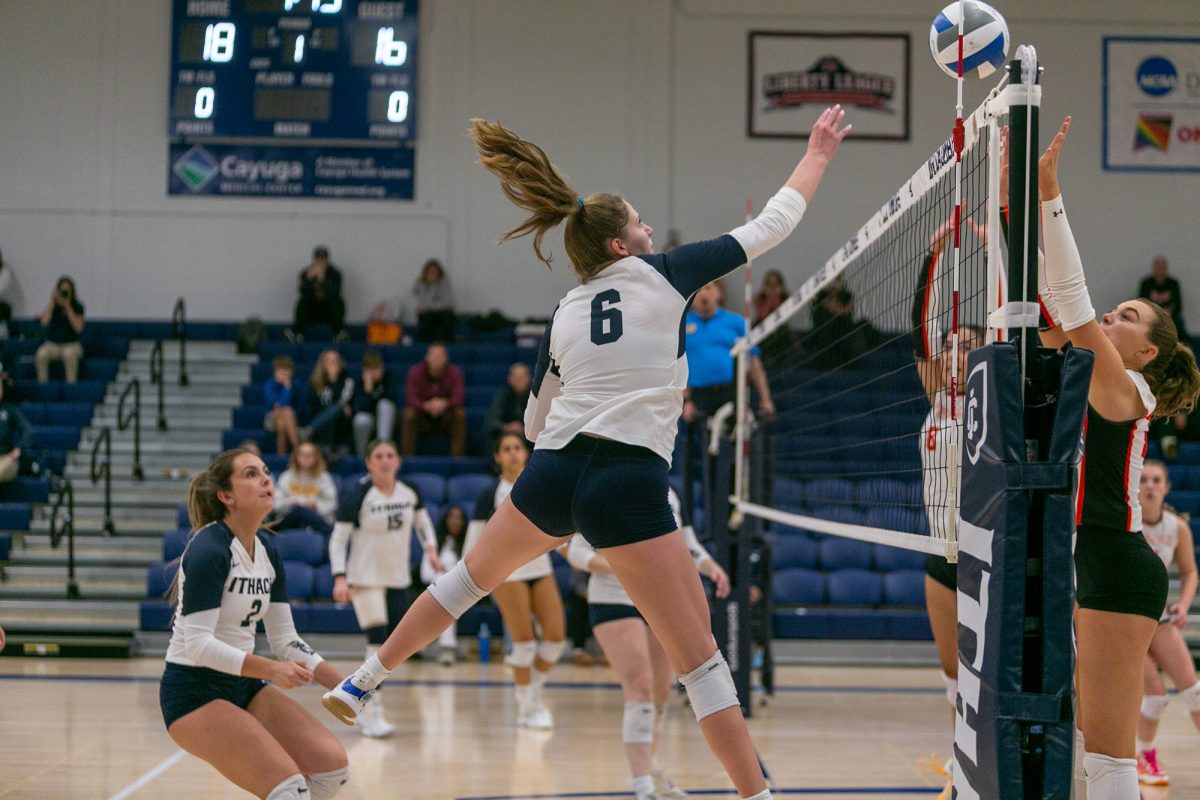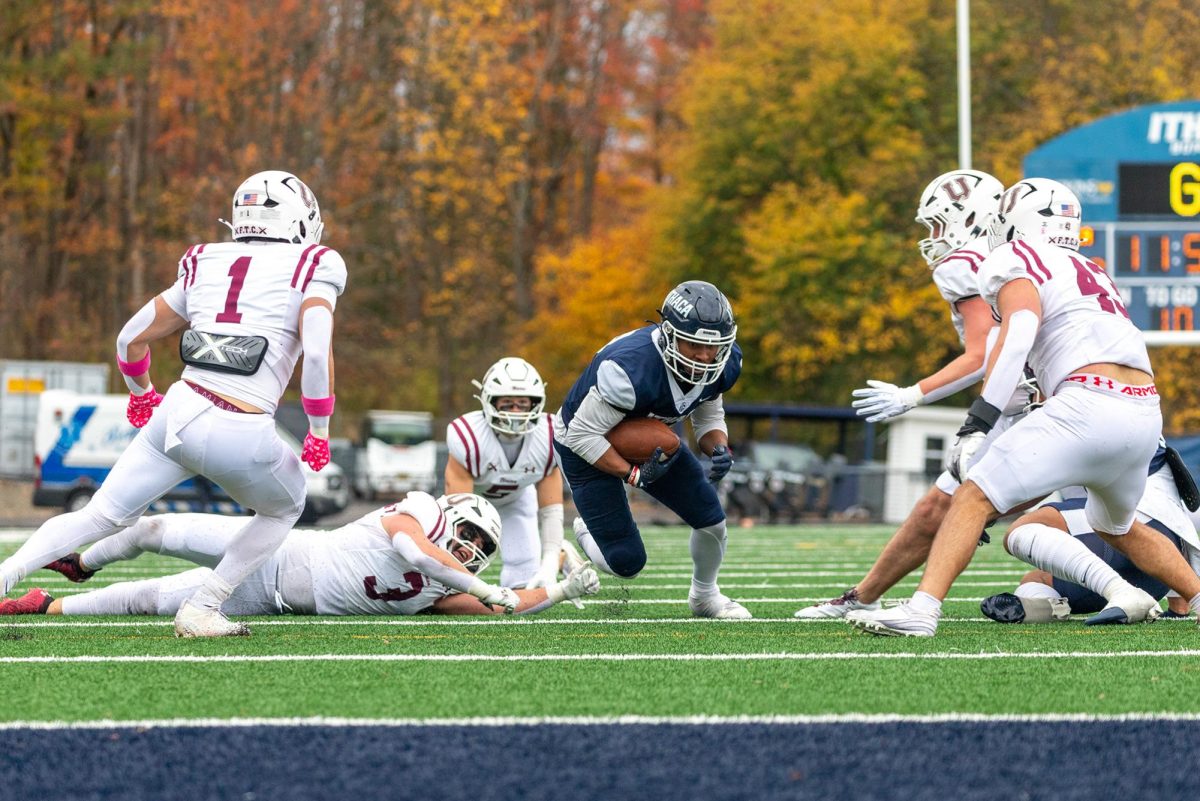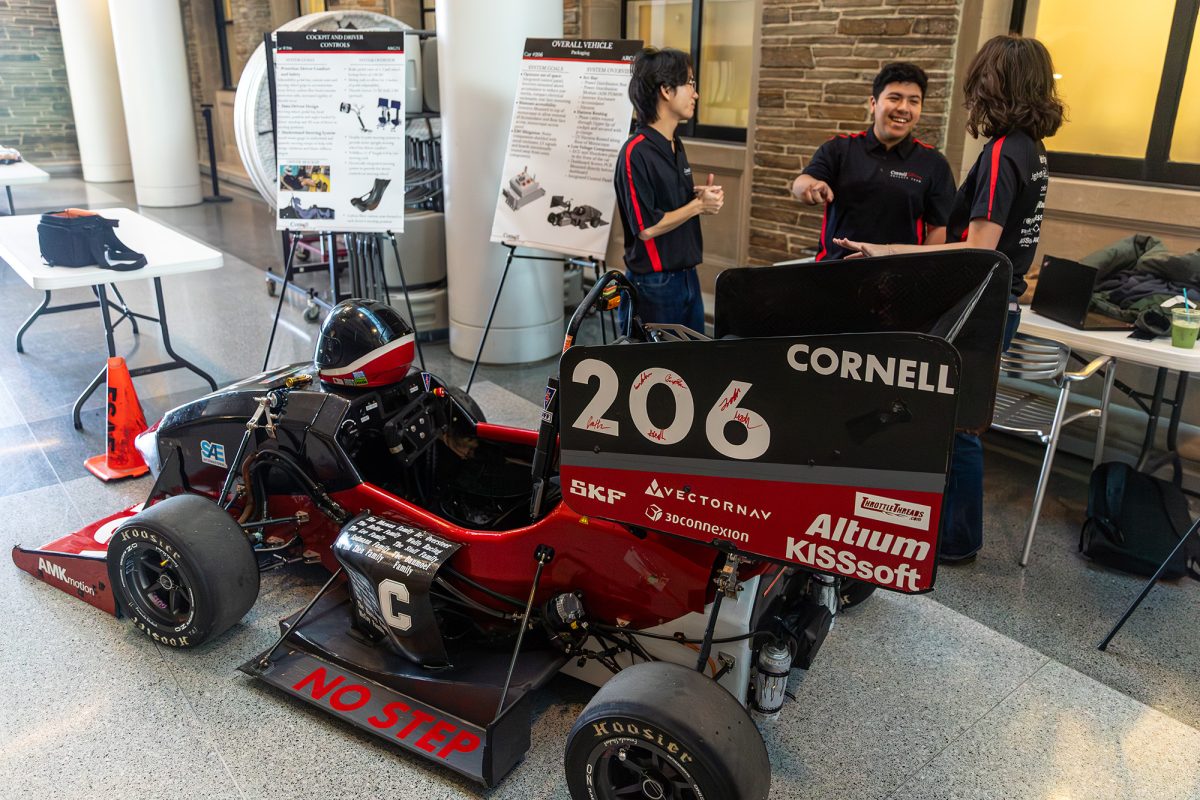Ithaca College and Cornell University are not only united by location but also through sports. Over the decades, the track and field and softball programs of both Ithaca and Cornell have formed interdependent relationships that benefit both schools through facility usage and inter-division competition.
In track and field, it is common for different divisions to cross paths at meets, with athletes from different levels even racing in the same heats. As a result of Ithaca College’s close proximity to Cornell, it is not out of the ordinary for the Bombers to be competing at meets with Cornell, Syracuse University, University at Buffalo and other Division I programs. According to Jennifer Potter, head coach of Ithaca College’s women’s track and field team, this is a factor that separates track and field from other sports.
“When we go to meets, there’ll be junior colleges, there could be high school, there could be Division I, Division II, Division III,” Potter said. “It’s a very unique aspect of our sport.”
Ithaca and Cornell have long had a link through track and field. Potter said that during her time as a sprinter for the Bombers in the ’90s, she and the rest of the track team would practice at Cornell’s Barton Hall in the winter season because Ithaca College did not yet have an indoor track.
It is an annual occurrence for the Bombers’ track and field team to compete at Cornell at several points of the year, including the Greg Page Relays on Dec. 1 and 2, the Marc Deneault Invitational on Feb. 17 and the Cornell Big Red Invitational on April 28. Similarly, Cornell athletes have competed at Ithaca’s Bomber Invitational meet.
Potter said that the higher level of competition is helpful for athletes and encourages them to work harder in preparation for future competitions.
Ithaca College senior sprinter Devan Adegbile echoed Potter and said the higher level of competition encourages her to perform better.
“I compete in a lot of races with Cornell athletes in them and so running with them also helps me,” Adegbile said. “Sometimes I make a PR because I run with them and they help push me. … It helps you want to run faster and do better further into the season.”
Even in the modern day, the track team still visits Cornell to train. In 2023, Ithaca’s Butterfield Stadium underwent renovations, which included the removal of the outdoor track. As a result, Adegbile and other sprinters on the team sometimes travel to Cornell’s Kane Sports Complex to train for the outdoor season. Adegbile said she believes that the experience of practicing and competing at Cornell in a Division I environment is overall beneficial.
“It helps us develop that mindset that we’re here for a reason and we deserve to be here,” Adegbile said. “Because maybe on paper, these D-I schools are supposed to be better than us; we just have to go out there and do the best we can and sometimes we even end up beating some of the D-I athletes.”
Potter said the coaching staff from Ithaca and Cornell make time to interact with each other away from the track as well, where they discuss “track talk,” like training camps, national and international competitions and other news in the sport. Their shared love of track brings them together.
“The bunch of us coaches try to get together and go for dinner or go to a hockey game or something, just because we know each other, and we spend a lot of time together just competing against each other,” Potter said. “It’s just a passion for the sport,” Potter said.
The coaching staff also help each other out with training and running events. Jacky Mendes ’15, who was a graduate assistant coach for the Bombers, is an assistant coach for the Big Red men’s team. Potter also mentioned that she worked with Cornell head coach Adrian Durant in the past.
On the other side of South Hill, the Bombers’ softball team has a tradition of playing against Cornell in the middle of the season, even though teams crossing between divisions is very uncommon in the sport. For Cornell softball head coach Julie Farlow, the difference in divisions does not make any difference.
“Sometimes you hear some other sports are hesitant to play a D-lll school because it’s a no-win situation,” Farlow said. “You’re supposed to beat them and if you lose to them, it’s a bad loss. But I just don’t feel that way about IC because they’ve always been very competitive.”
Farlow said that the Big Red team views the Bombers as they would any other opponent and that she believes both teams get a benefit out of playing each other.
“It’s what I tell our players all the time; this is a team whose goal every year is to make it to the national tournament, so I think there is this understanding that this is a very qualified and a historically successful program,” Farlow said. “It doesn’t matter if it’s a conference game or non-conference game, we’re trying to put our best product on the field,” Farlow said.
The relationship between Ithaca and Cornell softball has existed since the creation of Cornell’s varsity softball program in 1994. The two schools have played each other in 40 varsity matches over this 30-year history, with Cornell having the longest winning streak of 13 games and the Bombers a streak of six. The last four games have all been won by the Big Red, including this year’s game that ended 9–3 in favor of Cornell. The game began competitive – the Bombers were tied 3–3 going into the bottom of the third where the Big Red began to pull away.
Farlow, who played for the Big Red softball team, remembered playing matches against Ithaca College and of utilizing Ithaca’s field in the early days of the Big Red softball program.
“We played a couple of Cornell home games on the Ithaca campus because we didn’t have an on-campus field yet,” Farlow said. “So Ithaca was kind enough to let us play some league games over there when they were out of town.”
Farlow said that making the game come to reality is a collaborative effort between the two programs and gives Bombers’ head coach Kelly Robichaud much of the credit in getting the Big Red back on the schedule for 2024.
“So I’m really happy that [Robichaud] was willing to get us back on the schedule because scheduling is so difficult and when we only have a game a week, and there are other opponents in the area, and you’re trying to just cram in all these games in a short amount of time,” Farlow said. “I appreciate that both schools are still willing to get on each other’s schedule.”
Bombers’ junior utility Olivia Comolli said the placement of the game in the season does not distract from regular season competition and it helps to encourage the team to improve.
“Being able to go over and have fun and play Cornell, which is not a league game but is a game that we care about and want to win, I think it pushes us more,” Comolli said. ”It’s always like you can feel the energy. It’s like a crackling sensation where you’re like, ‘I can’t wait, I have to take the one extra swing, we have to stay for five more extra minutes to beat Cornell.’”















